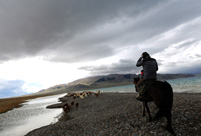 College-student-turned nun becomes famous on Internet
College-student-turned nun becomes famous on Internet
 Japanese airplanes tail Chinese warplane in China's ADIZ
Japanese airplanes tail Chinese warplane in China's ADIZ
 China applies for UNESCO listing of Nanjing documents
China applies for UNESCO listing of Nanjing documents
 Picturesque scenery in Hongcun Village
Picturesque scenery in Hongcun Village
 Japan's PM vows to resume commercial whale hunt
Japan's PM vows to resume commercial whale hunt
 Luoyang aims to become 'Chinese Culture City'
Luoyang aims to become 'Chinese Culture City'
 Century-old jade disc found confirms ancient legend
Century-old jade disc found confirms ancient legend
 A serious mind behind Chinese leader
A serious mind behind Chinese leader
 Panda Cubs to Predict 2014 World Cup Winners
Panda Cubs to Predict 2014 World Cup Winners
 China Southern Airlines flight attendants win titles in service contest
China Southern Airlines flight attendants win titles in service contest
YULIN, Guangxi, June 17 (Xinhua) -- While an old ethical debate has intensified over an upcoming annual dog-eating festival in south China, experts are more concerned about risks in gobbling animals with dubious quarantine records.
As in previous years, the event, slated for June 21 to mark the summer solstice in Yulin City in Guangxi Zhuang Autonomous Region, has drawn mounting protests from animal welfare groups and pet owners, who urge the local government to ban the long-standing tradition.
On the day, Yulin residents will eat dog meat alongside lychees. Activists say that about 10,000 dogs will be consumed on the occasion.
Despite the longstanding and fierce opposition to the event, the Yulin government has insisted that it will not step in because China does not outlaw dog-eating and the event is a folk custom.
However, this year, the government has suggested local restaurants serving dog dishes cover the character "dog" on their signboards during the festival to avoid exasperating opponents.
SUPERVISION LOOPHOLES
Earlier this month, seven Chinese experts in the fields of veterinary medicine, law and animal welfare sent a letter to the chairman of the regional government to plead for an end to the festival.
They wrote that mass consumption of dog meat on a single day increases the risk of rabies, since long-distance transport of live dogs is a cause of the fatal disease.
The Yulin government has long denied its involvement in organizing the event. But considering the dog-eating spree's potential link to a rabies outbreak, the letter said, it should not turn a blind eye to the practice.
China is second only to India in the number of human infections with rabies worldwide every year. Guangxi sees the most infections among all domestic municipalities, provinces and autonomous regions.
"Transporting and butchering so many dogs, if they haven't had the rabies vaccine, will pose a certain risk to those who do the job," said the letter.
Also, the experts pointed to food safety concerns due to unclear sourcing of the dogs. Citing their own investigations, animal welfare groups claim that most of the dogs consumed during the event are strays, pets as well as dogs stolen or poisoned, in Yulin or from other parts of the country.
Such allegations seem to have been backed up by a spate of dog thefts and poisonings reported across the country.
In the latest case, 11 people in Hubei Province were jailed in May for selling poisonous dog meat since the beginning of 2013. They killed about 1,000 dogs in the countryside with darts covered in toxic chemicals and sold the meat of about 10 of the animals before being caught in December.
The Yulin government, however, denies such risks. Chen Taotao, deputy head of the city's food and drug administration, said there have been no such dogs found by their inspections in local markets.
Wei Wanli, a worker with the city's aquatic products, animal husbandry and veterinarian bureau, said dogs sold in Yulin were mainly shipped from other places.
On highways leading to the city, authorities have been stopping trucks packed with live dogs to ask for the animals' quarantine certificates, without which the trucks are prohibited from entering the city, Wei said.
However, loopholes are obvious. Wei admitted that such checks are not in place on more minor roads and the authorities do not demand the certificate for each animal.
In addition, there is only light supervision of private butchers, who often move from one place to another and work at night, he said.
A regulation issued by the Ministry of Agriculture last April required that each dog receive laboratory tests for rabies, distemper and other diseases before being transported. The article, without specifying the penalty for a violation, has been poorly implemented.
The experts' letter pointed out that, if properly implemented, it would in effect ban mass transportation of dogs. The quarantine costs for hundreds of dogs in a truck would amount to at least 150,000 yuan (24,000 U.S. dollars), a fee nobody would be willing to pay.
TUG-OF-WAR
The dog-eating carnival has come under the spotlight due to rising awareness of animal rights among the public and the growing number of pet owners in recent years.
Notably, many Chinese pop stars have joined the camp of those campaigning to stamp out the tradition this year. But they may be disappointed by the results of an online poll entitled "What do you think of dog-eating?"
The ongoing poll, launched by Chinese portal Sina, showed 63 percent of over 68,000 respondents regard dog-eating as a "personal freedom" and one deserving no finger-pointing, while 25 percent say the practice should be condemned.
"To eat or not to eat, this question reflects the conflict between the folk custom and animal protection," said Zhou Xiaozheng, a sociology professor at Renmin University of China.
Zhou believes the calls for scrapping the consumption of dogs, the most common companion animal, should be respected because doing so would reflect social progress.
Since there is no end to the debate, he said what can be done now is to reduce the suffering of dogs for eating. The Yulin government promised it would strictly prohibit cruel killing in public during the festival.
The letter expressed concern that slaughtering dogs on streets or hanging their bodies in restaurants would be detrimental to children's mental health, citing investigations that found some serial murderers abused animals during childhood.
Zhong Guanghai, a 63-year-old resident of Yulin, saw no point in canceling the longstanding tradition. "But people shouldn't torture dogs when butchering them," he said.
Animal activist Pian Kongshan said he planned to join a TV debate and publish a book to build consensus to uproot the custom.
During the festival in 2012 and 2013, Pian drew public attention by kneeling down for photos in front of piles of dog carcasses at a Yulin market.
In 2011, a similar event derived from a 600-year-old tradition in Qianxi Township, Zhejiang Province, was banned following a public outcry.
 Super daddies in 2014 World Cup
Super daddies in 2014 World Cup Rebuilding the silk road
Rebuilding the silk road College girls take stylish photos to help enrollment
College girls take stylish photos to help enrollment Top 10 Chinese products scoring World Cup goal
Top 10 Chinese products scoring World Cup goal PLA units hone their tank combat skills
PLA units hone their tank combat skills Attendants shine at Xinjiang-Lanzhou high-speed rail
Attendants shine at Xinjiang-Lanzhou high-speed rail Jiuzhai Valley - fairyland of the world
Jiuzhai Valley - fairyland of the world Can't take eyes off national teams in World Cup
Can't take eyes off national teams in World Cup Beijing strips off to celebrate summer
Beijing strips off to celebrate summer
 Top 20 hottest women in the world in 2014
Top 20 hottest women in the world in 2014  China's top 10 representative architectures
China's top 10 representative architectures Cute animals' leisure summer in zoo
Cute animals' leisure summer in zoo Exhibition of the Buddha held in Tibet
Exhibition of the Buddha held in Tibet Grandpa Kang takes Gaokao for 14th time
Grandpa Kang takes Gaokao for 14th time Incredible animal migration in Xinjiang
Incredible animal migration in Xinjiang Day|Week|Month